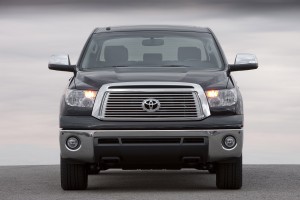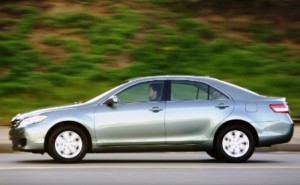With the first replacement accelerator components on their way to dealers around the country, Toyota officially announced today that it will begin repairing vehicles this week as part of its latest in a series of expanding safety recalls.
In an early morning news releae, the automaker said that it is working with dealers to complete repairs “as quickly and conveniently as possible,” and added that in some cases, dealers may stay open 24 hours a day until repairs are completed.
Meanwhile, a key automotive analyst suggested just the direct cost of the accelerator recall – which has grown from the original 2.3 million vehicles to 4.2 million in customer hands – will exceed $550 million, but the indirect costs, ranging from subsidies for dealers to settlements in lawsuits could dward that figure.
“Nothing is more important to us than the safety and reliability of the vehicles our customers drive,” said Jim Lentz, president and Chief Operating Officer, Toyota Motor Sales (TMS) U.S.A., in a press release. “We deeply regret the concern that our recalls have caused for our customers and we are doing everything we can – as fast as we can – to make things right.”

The addition of a small piece of precision cut steel is expected to fix the problem with sticky accelerators, Toyota said.
Lentz stressed that the automaker knows what led to the sticking accelerator pedals and how to fix the problem. In its release, the maker said:
“…The issue involves a friction device in the pedal designed to provide the proper “feel” by adding resistance and making the pedal steady and stable. The device includes a shoe that rubs against an adjoining surface during normal pedal operation. Due to the materials used, wear and environmental conditions, these surfaces may, over time, begin to stick and release instead of operating smoothly….”
A “precision cut” steel replacement bar will be inserted into the accelerator pedal on vehicles affected by the recall, according to Toyota, and that will eliminate the friction and the possibility of the accelerator pedal sticking, the company claims. The proposed fix has already been submitted to the National Highway Traffic Safety Administration, and the federal agency overseeing recalls and releated repairs raised no objections.
Exactly how soon dealers will actually have the parts, go through the necessary training and begin scheduling owners in for repairs isn’t entirely certain, though Toyota and its supplier, CTS Corp., were reportedly racing to expand production of the necessary parts.
Jack Fitzgerald, owners of the Washington, D.C.-area Fitzgerald Auto Mall, told TheDetroitBureau.com, on Sunday, he believes his service shop will be able to fix its first cars by Thursday of this week. He described the process as “quick and easy.”
But due to the size of the fleet of vehicles covered by the recall, it will still take quite some time to complete the process, observers caution. There are now 2.3 million vehicles in the U.S., a figure that has grown to 4.2 million recalled worldwide. That doesn’t include an estimated 200,000 on dealer lots that wll also need repair.
Part of the challenge for Toyota is getting parts not only to dealers but to its factories, as well. It has shut down the five assembly lines, in North America, which produce the eight models impacted by the recall.
The direct cost of the recall is now expected to reach at least $550 million, according to Kurt Sanger, auto analyst with Deutsche Bank, while Toyota will lose another $100 million for each week its plants are down. The shutdown was scheduled to begin today and run for a week, but without the necessary repair parts in volumes large enough to support production that shutdown could run later into February.
“However, indirect costs are mounting,” as well, warned Sanger.
Toyota is likely to spend significant amounts of money not just paying dealers to make repairs but to reimburse them for things like floor costs, the extra interest they will pay on vehicles that they currently cannot sell. Daily rental fleets, such as Hertz and Avis, are also expected to seek compensation for Toyota products they have had to quarrantine as a result of the recall.
“Further, Toyota will likely need to reserve against potential liability in several class action suits being filed. It is not beyond question that this could top $1.1 billion,” said Sanger.
There’s an additional cost that will be far more difficult to define, Sanger and other analysts are warning, the potential impact to Toyota’s once-sterling image for quality and reliability.
“Customers are scared,” said dealer Fitzgerald, and even though today’s announcement from Toyota should help ease such concerns, it is unclear if Toyota will ever be able to fully rebuild its image, especially at a time when all the data show a variety of makers have matched and even exceeded the quality of Toyota products.
Vehicles impacted by the recall are:
• Certain 2009-2010 RAV4
• Certain 2009-2010 Corolla
• 2009-2010 Matrix
• 2005-2010 Avalon
• Certain 2007-2010 Camry
• Certain 2010 Highlander
• 2007-2010 Tundra
• 2008-2010 Sequoia


